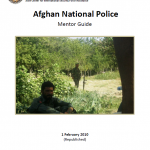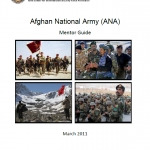
“First time I ever saw an Afghan Police Station I thought it was something straight out of the dark ages, complete with zero electricity, mud structure, and no sewage drainage. Immediately I knew this mission would be challenging and wondered what the heck I got myself into?” This quote from a U.S. Army Captain is just one example of the unusually blunt assessments contained in the Joint Center for International Security Force Assistance (JCISFA) guide for advising the Afghan National Police (ANP). The 2010 version of the JCISFA ANP Mentor Guide, which was obtained by Public Intelligence along with a guide for troops assisting the Afghan National Army (ANA), contains a number of revealing observations on the often poor condition of Afghan National Security Forces, in particular the ANP.


